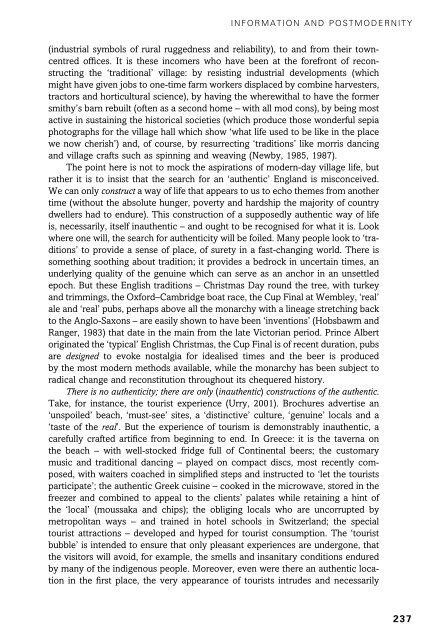Theories of the Information Society, Third Edition - Cryptome
Theories of the Information Society, Third Edition - Cryptome
Theories of the Information Society, Third Edition - Cryptome
Create successful ePaper yourself
Turn your PDF publications into a flip-book with our unique Google optimized e-Paper software.
INFORMATION AND POSTMODERNITY<br />
1<br />
1<br />
1<br />
2<br />
1<br />
1<br />
(industrial symbols <strong>of</strong> rural ruggedness and reliability), to and from <strong>the</strong>ir towncentred<br />
<strong>of</strong>fices. It is <strong>the</strong>se incomers who have been at <strong>the</strong> forefront <strong>of</strong> reconstructing<br />
<strong>the</strong> ‘traditional’ village: by resisting industrial developments (which<br />
might have given jobs to one-time farm workers displaced by combine harvesters,<br />
tractors and horticultural science), by having <strong>the</strong> wherewithal to have <strong>the</strong> former<br />
smithy’s barn rebuilt (<strong>of</strong>ten as a second home – with all mod cons), by being most<br />
active in sustaining <strong>the</strong> historical societies (which produce those wonderful sepia<br />
photographs for <strong>the</strong> village hall which show ‘what life used to be like in <strong>the</strong> place<br />
we now cherish’) and, <strong>of</strong> course, by resurrecting ‘traditions’ like morris dancing<br />
and village crafts such as spinning and weaving (Newby, 1985, 1987).<br />
The point here is not to mock <strong>the</strong> aspirations <strong>of</strong> modern-day village life, but<br />
ra<strong>the</strong>r it is to insist that <strong>the</strong> search for an ‘au<strong>the</strong>ntic’ England is misconceived.<br />
We can only construct a way <strong>of</strong> life that appears to us to echo <strong>the</strong>mes from ano<strong>the</strong>r<br />
time (without <strong>the</strong> absolute hunger, poverty and hardship <strong>the</strong> majority <strong>of</strong> country<br />
dwellers had to endure). This construction <strong>of</strong> a supposedly au<strong>the</strong>ntic way <strong>of</strong> life<br />
is, necessarily, itself inau<strong>the</strong>ntic – and ought to be recognised for what it is. Look<br />
where one will, <strong>the</strong> search for au<strong>the</strong>nticity will be foiled. Many people look to ‘traditions’<br />
to provide a sense <strong>of</strong> place, <strong>of</strong> surety in a fast-changing world. There is<br />
something soothing about tradition; it provides a bedrock in uncertain times, an<br />
underlying quality <strong>of</strong> <strong>the</strong> genuine which can serve as an anchor in an unsettled<br />
epoch. But <strong>the</strong>se English traditions – Christmas Day round <strong>the</strong> tree, with turkey<br />
and trimmings, <strong>the</strong> Oxford–Cambridge boat race, <strong>the</strong> Cup Final at Wembley, ‘real’<br />
ale and ‘real’ pubs, perhaps above all <strong>the</strong> monarchy with a lineage stretching back<br />
to <strong>the</strong> Anglo-Saxons – are easily shown to have been ‘inventions’ (Hobsbawm and<br />
Ranger, 1983) that date in <strong>the</strong> main from <strong>the</strong> late Victorian period. Prince Albert<br />
originated <strong>the</strong> ‘typical’ English Christmas, <strong>the</strong> Cup Final is <strong>of</strong> recent duration, pubs<br />
are designed to evoke nostalgia for idealised times and <strong>the</strong> beer is produced<br />
by <strong>the</strong> most modern methods available, while <strong>the</strong> monarchy has been subject to<br />
radical change and reconstitution throughout its chequered history.<br />
There is no au<strong>the</strong>nticity; <strong>the</strong>re are only (inau<strong>the</strong>ntic) constructions <strong>of</strong> <strong>the</strong> au<strong>the</strong>ntic.<br />
Take, for instance, <strong>the</strong> tourist experience (Urry, 2001). Brochures advertise an<br />
‘unspoiled’ beach, ‘must-see’ sites, a ‘distinctive’ culture, ‘genuine’ locals and a<br />
‘taste <strong>of</strong> <strong>the</strong> real’. But <strong>the</strong> experience <strong>of</strong> tourism is demonstrably inau<strong>the</strong>ntic, a<br />
carefully crafted artifice from beginning to end. In Greece: it is <strong>the</strong> taverna on<br />
<strong>the</strong> beach – with well-stocked fridge full <strong>of</strong> Continental beers; <strong>the</strong> customary<br />
music and traditional dancing – played on compact discs, most recently composed,<br />
with waiters coached in simplified steps and instructed to ‘let <strong>the</strong> tourists<br />
participate’; <strong>the</strong> au<strong>the</strong>ntic Greek cuisine – cooked in <strong>the</strong> microwave, stored in <strong>the</strong><br />
freezer and combined to appeal to <strong>the</strong> clients’ palates while retaining a hint <strong>of</strong><br />
<strong>the</strong> ‘local’ (moussaka and chips); <strong>the</strong> obliging locals who are uncorrupted by<br />
metropolitan ways – and trained in hotel schools in Switzerland; <strong>the</strong> special<br />
tourist attractions – developed and hyped for tourist consumption. The ‘tourist<br />
bubble’ is intended to ensure that only pleasant experiences are undergone, that<br />
<strong>the</strong> visitors will avoid, for example, <strong>the</strong> smells and insanitary conditions endured<br />
by many <strong>of</strong> <strong>the</strong> indigenous people. Moreover, even were <strong>the</strong>re an au<strong>the</strong>ntic location<br />
in <strong>the</strong> first place, <strong>the</strong> very appearance <strong>of</strong> tourists intrudes and necessarily<br />
237
















